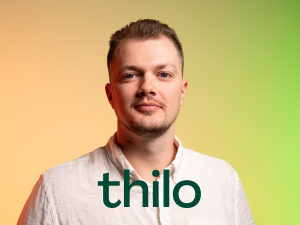‟ It wasn’t tech that pulled me in, but the bigger questions about how we build a better future and how innovation can be used to rethink the systems we rely on.”
Meet Thilo Pollmeier, a German researcher who left corporate life in Cologne to join the research world at SnT. He’s on a mission to prove that sustainability isn’t about limitation; it’s about transformation. His work explores how companies can thrive financially while doing good for people and the planet, challenging the false choice between profit and purpose in today’s rapidly changing world.
Tell us about your educational background and path to research.
My academic background bridges sustainability and innovation. I hold degrees in Environmental Business Management and Business Administration, with a focus on innovation. During my studies, I had the opportunity to study in both Europe and the United States, which broadened my international perspective. I joined SnT in October 2022 as a doctoral researcher in the Entrepreneurship, Innovation, and New Technology research group, after living and working in Cologne, Germany.
What’s the first word that comes to mind when you think about your research?
Transformation. It wasn’t tech that pulled me in, but the bigger questions about how we build a better future and how innovation can be used to rethink the systems we rely on.
‟ Today’s challenges – climate change, social inequality, technological disruption – demand more than minor adjustments. We need to fundamentally rethink how we define value, make decisions, and build businesses.”
What are you exploring in your research today?
I study how sustainability practices influence what companies say and do – from their public communication to their strategic decisions. I’m particularly interested in how firms reconcile the competing demands of economic performance and societal expectations. My research explores how companies can do well for themselves while also doing good things for people and the planet.
What’s been your biggest research challenge so far?
One of the biggest challenges has been translating empirical results into robust theoretical constructs. It’s not just about what the data shows, but how it informs and advances existing theory – finding that connection is both demanding and essential. A big part of research is not knowing – asking questions, being confused, and figuring things out along the way.
How has your background influenced your research approach?
My path through academia has been anything but linear, and that has become a strength. It taught me to look across boundaries – between fields and between ideas, which is essential when dealing with complex topics like sustainability and innovation.
What’s a common misconception about your field you’d love to clarify?
‟ People often assume that sustainability means limiting ourselves; using less or slowing down. But in reality, the opposite is often true”
Companies that embrace sustainability can drive innovation, strengthen their reputation, and generate long-term value for both business and society. It’s about transformation, not limitation.
What’s the research environment like at SnT in terms of diversity?
I haven’t come across others at SnT with the same background as me, but I also never saw that as a disadvantage. What I’ve come to value, especially at SnT, is how intercultural and international the research environment is.
‟ Working with colleagues from all over the world has shown me that diverse perspectives aren’t just welcome – they’re essential for meaningful innovation.”
What does tech research need more of?
Interdisciplinary thinking. Some of the most exciting ideas come when fields collide. We also need to create environments where everyone feels heard and respected, no matter their background or experience. That means supporting each other, being open to different perspectives, and making space for all kinds of ideas.
